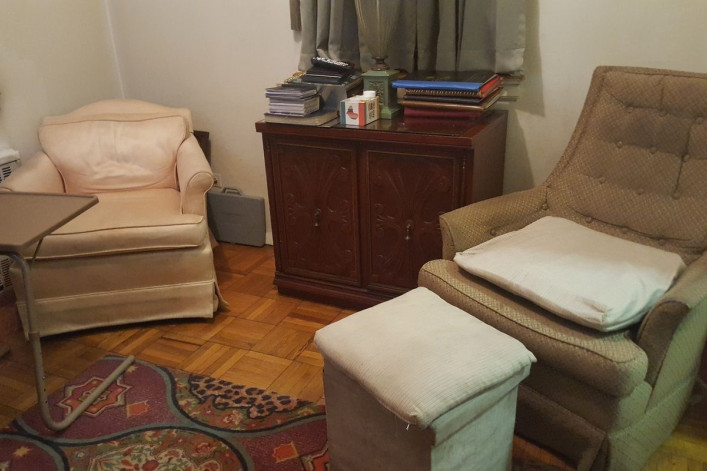Why do people use crappy photos when they are trying to sell or rent an apartment?

With pictures like this, it's no surprise this one bedroom in the Bronx has been on the market more than 200 days.
The listing may tell you the price has been cut and the seller is motivated but bad photos, like the ones used to advertise 800 Grand Concourse #GJN, above, will not prompt a quick sale. Even though the asking price of $185,000 for this one bedroom in the Bronx is well below the median for the area, the apartment has been sitting on the market for months—no surprise there.
The real mystery is why people would even use bad listings photos to begin with. You don't need to be a real estate expert to know they are a turn off to renters and buyers.
"It is very hard for someone to justify spending six or seven figures when they see photos up on a website that look like an afterthought,” says Daniele Kurzweil, a broker with Compass.
A lack of professionalism, or worse
Bad or non-existent photos point to a lack of professionalism, says Phillip Salem, a broker at Triplemint (a Brick Underground partner). But it can also be a warning sign.
“Lack of photos on the seller-side absolutely hint at something dodgy,” he says. Unless the seller discloses the apartment is in need of major renovations, a listing without photos may indicate there’s a mismatch between what the seller says about the unit and what it actually looks like.
In some cases, it's because a bedroom isn't legal, because it lacks window, is in the basement, or is too small. Apartments that have been carved up to create extra bedrooms can be extremely dangerous. Brush up on the legal requirements for a bedroom in NYC—and always scrutinize the dimensions of any floor plans.
Departing renters who don't give a damn (landlords too)
One of the reasons you'll see a lot of messy and cluttered photos for rentals in particular, agents tell Brick Underground, is because vacating tenants don't really have an incentive to help get an apartment re-rented. After all, their lease is up, they are leaving for someplace else—why should they help their landlord make the apartment look good for someone else? (Obviously, it's the grown-up thing to do, but not everyone behaves that way.)
Landlords, for their part, don't want to wait for the tenants to leave to photograph the apartment when it is clean and empty. And as a result, you'll see photos that make you want to take a shower after looking at them.
If the reason for the bad pictures is because the agent or owner is more concerned about a quick turnaround on the apartment than spending the time getting good photos, Salem says that can backfire.
"The first photo a buyer sees should capture their emotions and they should be able to envision a future in the apartment. If the first photo they see is a fuzzy image of a messy apartment, no feelings are instigated," and he says the potential buyer or renter will walk away.
Sometimes an owner may want an apartment listing to go up right away, in spite of poor or non-existent photos, to fulfill legal requirements that they are marketing the unit. John Harrison, a broker with CORE, says he tries to talk landlords out of doing this but sometimes they are "less concerned about first impressions but more keen to protect themselves legally."
New Yorkers may even see more rushed listings as a result of the recent rule change that requires a landlord to make every effort to re-rent an apartment if a tenant breaks the lease, rather than relying on suing the tenant for all the unpaid rent.
The apartment needs gutting
If there are no photos at all or only pictures of the neighborhood, it may mean the apartment needs a total overhaul. Harrison says that's when it's important to "read the listing, which lends more information on the lack of photos." If the listing tells you to bring an architect to the viewing, that's code for "the apartment is a wreck." The agent may also indicate pictures are coming soon, when renovation work is completed.
Harrison says he recently sold a three-family estate building in Brooklyn that he expected a buyer to tear down. He says every room was in bad shape; dirty, dusty, and overflowing with boxes which did not lend itself to good photos. Even so, he says interest in the listing saw a "noticeable uptick" when he complimented the neighborhood pictures with a photo of the interior's parquet flooring, even though it would likely be ripped out.
It's a sponsor apartment
Sponsor apartments are perhaps more likely than other listings to have bad or non-existent photos. That's because they are usually former rental apartments and while a sponsor will want a good price, they may not be as motivated as a seller whose apartment is their major asset.
If a unit is tenant-occupied, but for sale, there may be privacy issues and a tenant may not want to have photos taken of the apartment.
Kurzweil says buyers are often hesitant to see sponsor-owned apartments where there is no information provided other than an address. She visited one recently that was an "estate sale and in shambles" and persuaded her clients to see it. She also showed them a similar apartment where the same sponsor had renovated so they could see the potential of the unit.
"Had the sponsor shown photos of the apartment in its current condition, they never would have come to look," she says. On the other hand, had the sponsor used photos from another renovated apartment, she says the buyers would have been outbid because so many more people would have come to look at the space.
You Might Also Like




























